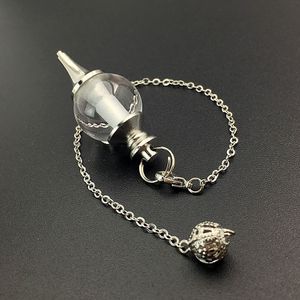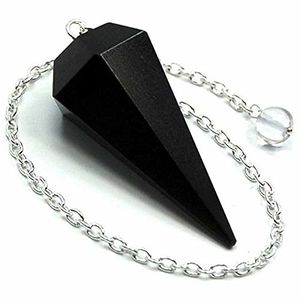

A divining pendulum is any of a class of objects. They are similar to a plumb bob in design, a weight attached to the end of a chain, cord, or string. The weight can be made of usually just about anything, though different substances produce different sensitivities in divination. Most often they are made of stone or crystal, the substance or divide need not be imbued with any kind of energy whatsoever, though for the purposes of this article, they are considered to be so imbued.
Purpose
The purpose of the object is to direct the user toward something the user wishes to find. In its most basic usage it can be used to detect "cold" or "hot" spots corresponding to disturbances in Aether, even if those disturbances happened some time ago. More advanced usage can be seen in conjunction with a divination spell which the caster uses to product a disturbance in the Aether of a map or some other kind of surface. In this case the disturbance is created to track or locate something with greater accuracy, the spell causes Aether to build up in a location on the given map and then the pendulum is attracted to that allowing the caster to read the results of the spell.
Usage
The weight itself will be attracted to any buildup of Aether and be repelled by any reduction in Aether. Should the weight not be moved in any direction, the Aether is in balance. Free hanging the pendulum will thus point in the direction of the highest concentration of Aether nearby. The effective range is usually within a set region, such as a house or property grounds and is affected by boundaries / borders. If a spell is used, the pendulum should be placed over a map and will gravitate toward the area of the map the spell highlights.
Construction
A weight made of quartz is the most common but the most useful is one made of Videns Autem Magia. Since the crystal detects disturbances in Aether naturally it is a much more sensitive object for divination. Metals can be used but tend to be less sensitive but can be used to differentiate between different kinds of disturbances in Aether while crystals or stones tend to differentiate between different elemental disturbances.
Metals
Alloys such as Steel or Brass can focus on chaotic disturbances. Particularly brass which will wobble or even vibrate in tune with a chaotic disturbance. Alloys of gold will change their movements or behavior based on the flow of Aether in a region, this is particularly true of rose gold which will lean not only in the direction of Aether but the flow of Aether.
Stones
Most stones are attracted to a particular elemental force and thus when used as the weight for the pendulum can be used to detect variations in a particular elemental force.
Crystals
The nature of crystal makes it ideal to highlight disturbances in Aether. As with any kind of stone most crystals can be used to detect changes in elemental forces. The difference between a crystal and a stone is the crystals are particularly sensitive. This also comes with a risk as in particularly powerful disruptions, they may absorb too much Aether which can be dangerous.
Chain vs Cord / String
For the most part chain is almost always used. This is not a requirement but a divining pendulum can be made more robust by using specific metals in the chain or having multiple chains. The metal of the chain can help acting as a conduit of energy from the user into the pendulum.
Imbued
While not all divining pendulums are imbued with any energy, artifacts are. Runes are a particular go-to for tuning a pendulum to a particular focus or can increase its power. When using a map they can also be imbued with a particular pattern so that the pendulum itself channels the energy which highlights a particular location on a map.